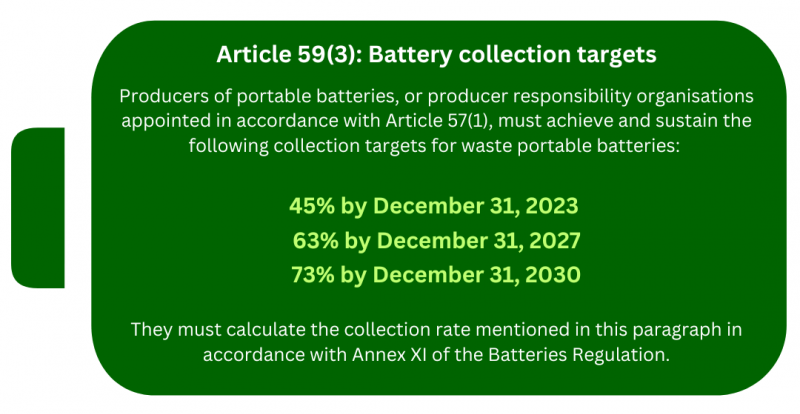Collection and Recycling
Published: January 30, 2024
The Battery Directive of 2006 and the 2023 Batteries Regulation reiterate the principle of producer responsibility for collecting and recycling waste batteries. In particular, Article 59 of the new Batteries Regulation introduces several changes in terms of content and obligations related to the collection and recycling of waste batteries.
Under Article 8 of the 2006 Battery Directive, Member States were required to ensure appropriate collection schemes were in place for waste portable batteries. However, the Directive did not provide specific details on how producers should comply with this legal requirement. It only stated that Member States should establish collection schemes and that producers should finance the costs associated with collecting, treating, and recycling collected portable batteries.
In contrast, Article 59 of the Batteries Regulation expands on these requirements and introduces more specific obligations for producers. Producers of portable batteries or producer responsibility organizations must ensure that all waste portable batteries are collected separately within the territory of a Member State where they are made available on the market for the first time. This includes establishing a waste portable battery take-back and collection system and offering free collection of waste portable batteries to relevant entities. Producers must also provide practical arrangements for collection and transport, collect waste portable batteries with appropriate frequency, and ensure that collected batteries are treated in permitted facilities.
Additionally, the Batteries Regulation sets collection targets for waste portable batteries that producers or producer responsibility organisations must attain and maintain. These targets increase over time, with the aim of achieving higher collection rates. End-users should be able to discard waste portable batteries at designated collection points without being charged or obligated to buy new batteries.

The new Regulation also addresses the complexity of portable battery collection, considering factors such as consumer awareness, legal frameworks, density of collection points, variety of collection streams, and the responsibility of all actors in the waste collection process. It emphasizes the need for a workable and cost-efficient compliance organization and highlights the potential benefits of binding EU minimum performance requirements for Extended Producer Responsibility (EPR) schemes.
Portable battery collection is very complex and is subject to various parameters such as consumer awareness, legal frameworks, the density of the collection points, the variety of collection streams, and the need to ensure that every actor in the waste collection process takes responsibility. Whereas the Batteries Directive left many gaps regarding the collection of batteries, the Batteries Regulation builds upon its principles by specifying detailed obligations for producers, setting collection targets, and addressing various aspects of portable battery collection. These changes aim to enhance the effectiveness and efficiency of the collection and recycling processes while promoting a level playing field for all EPR schemes and a viable market for secondary raw materials.
EUCOBAT is the primary stakeholder dealing with the collection and recycling of waste batteries in the European Union. As the European association of national battery collection schemes, EUCOBAT's members are committed to ensuring that all waste batteries are collected and recycled in an environmentally friendly manner within their respective Member States. This collective effort contributes to the preservation of our environment.
